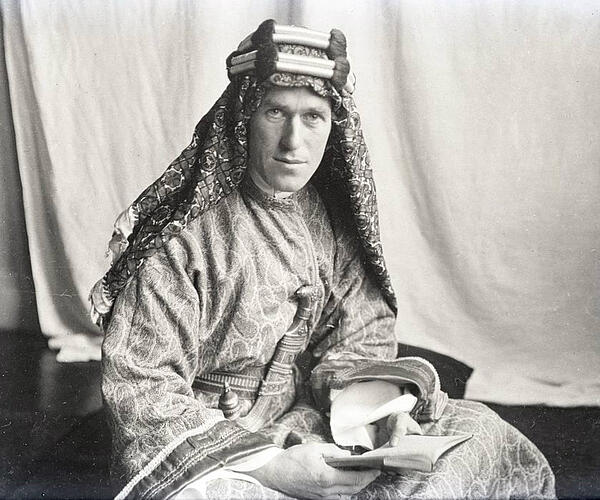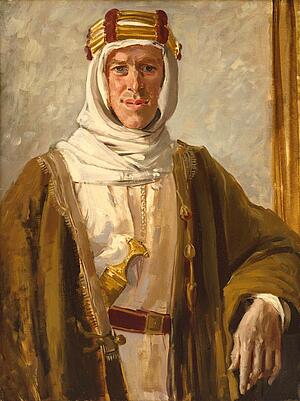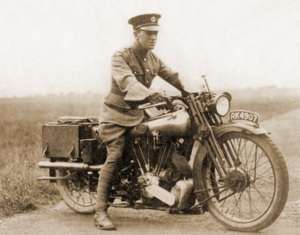Lawrence of Arabia
Lawrence of Arabia was a British Army officer, archaeologist and writer who found fame in World War One for his work in the Middle East. He has since gained an almost mythical status amongst the Arabs and in popular culture.
Born in Wales in 1888, Lawrence showed himself to be a very intelligent child and was reading Latin at the age of six. Lawrence studied History at Jesus College, Oxford and graduated with a first class honours.
He first visited the Middle East to research the Crusader castles for his graduate thesis. After he finished university, Lawrence joined archaeologist D G Hogarth on an expedition to excavate Carchemish. He got on well with the Arab people he talked to on the expedition and made a conscious effort to learn their language and understand their customs.
When World War One was declared, Lawrence signed up to join the regular army, but he was rejected because he fell below the five feet five inches requirements set by the army. Instead, he joined the intelligence branch of the general staff. He was posted to Egypt where he served in the 'Arab Bureau' at GHQ. Whilst Lawrence was a skilled junior officer, he was renown for his cheeky manner and scruffy uniform.

At the beginning of the war the Ottoman Empire had declared a holy war against Britain, France and Russia. The Ottoman Empire had hold of a large portion of the Middle East and their occupation triggered a revolt amongst the Arabs. So when the British launched a military campaign in the Middle East they fought alongside the Arabs. On 5 June 1916, the Arab Revolt began in the Hejaz. It had the aim of securing independence from the Ottoman Turks.
The revolt was successful in some areas at the start. However, the Arabs failed to take the region’s main rail line and the Turks were able to replenish their troops there. This meant the revolt lost its initial objective. In October 1916, the British sent Ronald Storrs to investigate the revolt, accompanied by Lawrence.
It was clear that Lawrence’s natural affinity with the Arabs would prove to be very useful. On his first meeting with Amir Feisal, the son of the ruler of Hejaz, the two developed an instant rapport. Lawrence helped Feisal to organise his ill-disciplined but devoted troops. He knew that the key to capturing Medina was to use guerilla warfare to attack the rail line that supplied the occupied city.
Lawrence did not want to destroy the rail line. It was the only link between Medina and Damascus. Instead, he planned to attack the Turks along the route of the rail line so that they would have to direct their troops towards the line. As Lawrence and the Hejaz Arabs continued north, they were joined by the Transjordan tribes. On 6 July 1917, Lawrence helped defeat a whole Turkish battalion Arab followers by capturing Aqaba from the rear.
Feisal moved his headquarters to Aqaba and made General Allenby the general commander. Allenby wanted to use the growing Arab revolt against the Turks to his advantage. Feisal hoped that the conscripted Arab units within the Turkish Army would lead to them abandoning the Ottoman cause in a demonstration of Arab unity.
A growing number of Arab tribesmen joined the revolt as it gathered momentum. The Turks struggled to cope with the revolt. On 9 December 1917, Allenby's forces entered Jerusalem, accompanied by Lawrence.

Both men respected each other. Allenby allowed Lawrence to wear Arab dress, even though many other British officers were against it. In January 1918, Lawrence commanded an attack on the Turks which saw the defeat of an entire battalion. The British had planned for a massive attack against the Turks - 19 September 1918. Allenby asked Lawrence to divert the Turks at an important rail junction at Deraa on 17 September. It was a successful attack. After entering Feisal, Lawrence took command of civil and military order for several weeks. On 31 October 1918, the Turks agreed to an armistice.
Lawrence lived with the Arabs he had fought with. He lived like a Bedouin - an ethnic group descended from the nomads of the Arabian deserts. Lawrence adopted the customs, dress and habits of the Arabs. He ate the same foods (often leading to stomach ailments), and in doing so gained the respect of those who fought with him.
Historians still debate how important Lawrence was to the campaign in the Middle East. His meeting with Feisal was certainly a turning point in the campaign. With his implementation of guerilla warfare, the campaign picked up. His rapport with those he fought with made him an effective leader at a time when few British officers were willing to befriend the Arabs.
Winston Churchill summarised Lawrence’s feat in his book Great Contemporaries:
The [German-led] Turkish armies operating against Egypt depended on the desert railway. The slender steel track ran through hundreds of miles of blistering desert. If it were permanently cut the Turkish armies must perish: the ruin of Turkey must follow and with it the downfall of the mighty Teutonic power which hurled its hate from ten thousand cannons on the plains of Flanders. Here was its Achilles heel, and it was upon this that this man in his twenties directed his audacious, desperate, romantic assaults.

Lawrence joined the Arab delegation in the Versailles Peace Conference where they hoped their reward for helping the Allie would be full independence. However, they were disappointed. Britain and France divided the Middle East. After Versailles, Lawrence left the army. He was made a Fellow of All Souls in 1919 and dedicated his time to writing "Seven Pillars of Wisdom", an account of the Arab Revolt.
After the war Lawrence’s work in the Middle East and literary achievements turned him into a celebrity. He enlisted in the RAF in 1922 under the name J. M. Ross to escape his fame. When the media discovered his true identity, he signed up with the Royal Tank Corps under the name T. E. Shaw. But he did not enjoy this job and rejoined the RAF in 1925. He served in India before returning to Britain in 1929.
Lawrence died a few months after leaving the RAF. He was riding his beloved Brough Superior SS100 motorbike at full speed along a country road in Dorset when he crashed after swerving to avoid two boys.
MLA Citation/Reference
"Lawrence of Arabia". HistoryLearning.com. 2026. Web.
